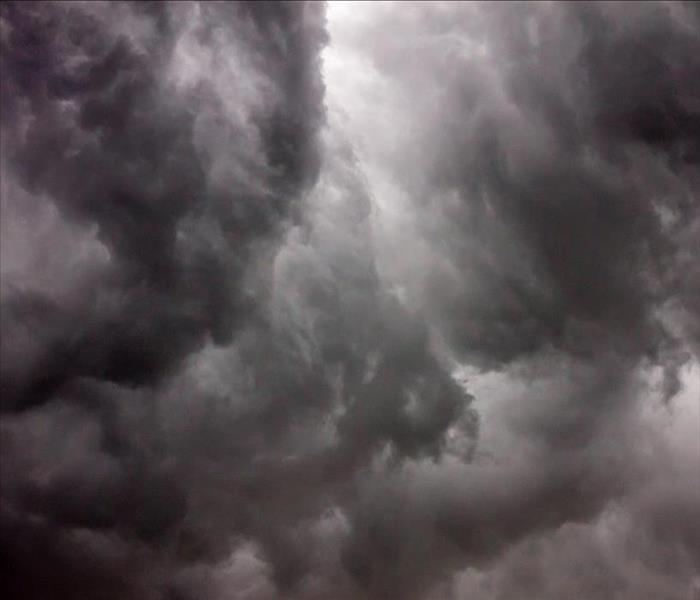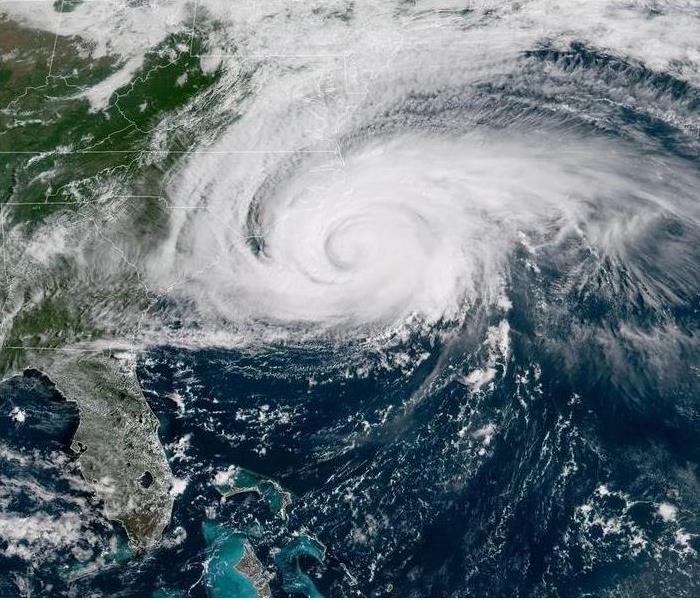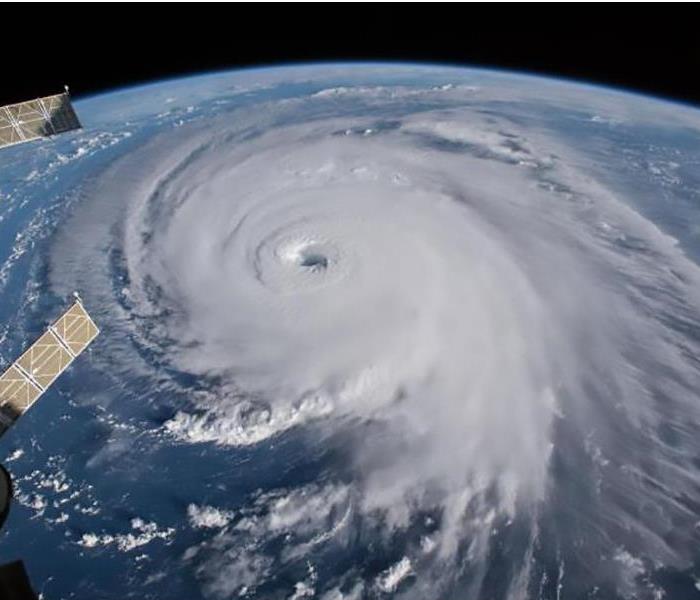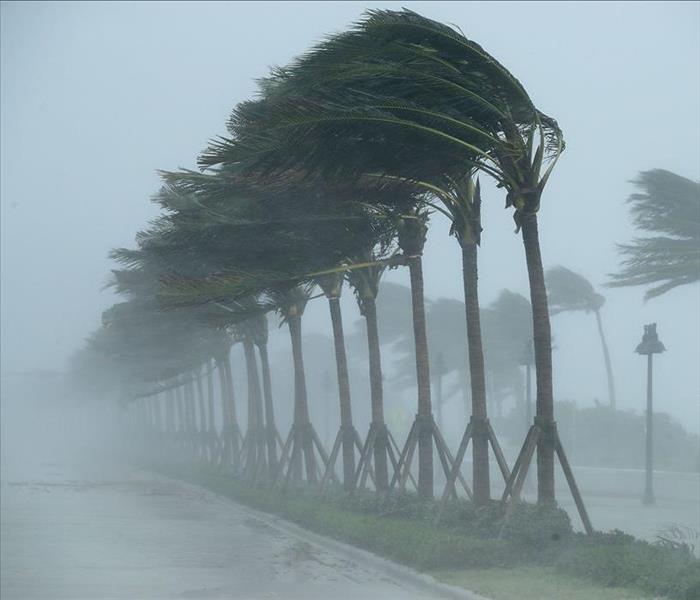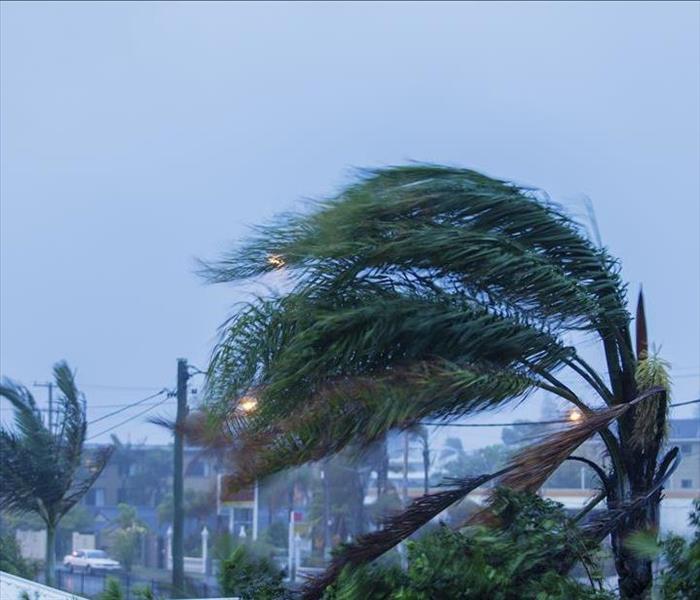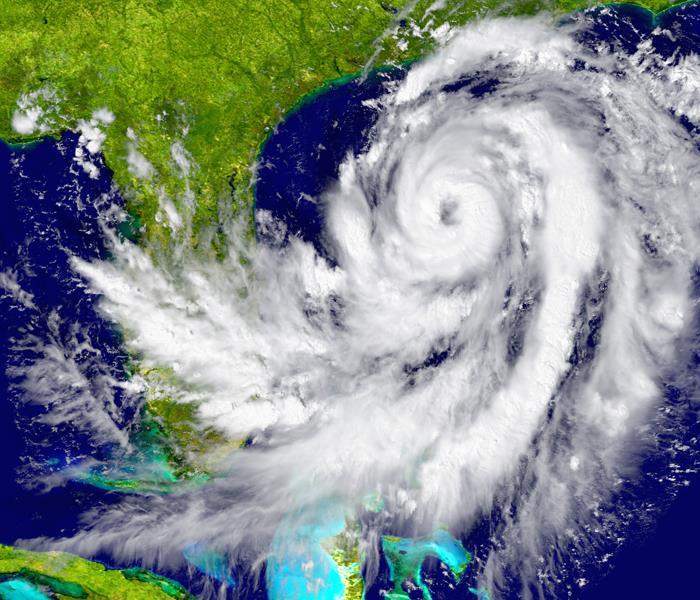Recent Storm Damage Posts
Help for Flood Damage Cleanup in Wilton Manors
10/10/2023 (Permalink)
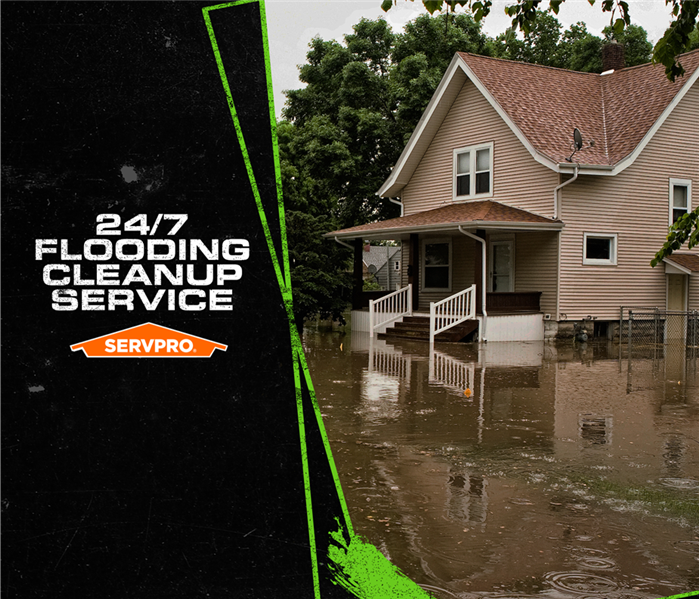 If a storm leaves your Wilton Manor home with flood damage, call SERVPRO. We're Faster to any size disaster™.
If a storm leaves your Wilton Manor home with flood damage, call SERVPRO. We're Faster to any size disaster™.
Flood Damage Cleanup in Wilton Manors by SERVPRO®
Wilton Manors is a vibrant city known for its local landmarks and tourist destinations. One of the must-visit spots is the Wilton Manors Historical Society, which showcases the area's rich history through exhibits and artifacts. For nature enthusiasts, the Richardson Historic Park and Nature Preserve offer lush greenery, walking trails, and picnic areas. Wilton Drive is the city's heart, with trendy shops, art galleries, and diverse dining options. In recent years, Wilton Manors has faced challenges like flood damage caused by extreme weather events. However, the resilient community has come together to restore and rebuild, ensuring that local landmarks and tourist destinations thrive and enchant visitors.
To ensure a safe and effective restoration, you need professionals like SERVPRO for flood damage cleanup in Wilton Manors. Our IICRC-certified restorers use state-of-the-art technology and equipment to restore your flooded property to its preloss condition “Like it never even happened.”
Using Dehumidifying Equipment During Flood Restoration
Like many coastal areas, Wilton Manors has faced the destructive impact of flood damage in recent years. The city's distinctive waterfront homes and historic buildings have been vulnerable to rising waters. Schools like Wilton Manors Elementary and parks like Mickel Park have also been affected, disrupting residents' lives and challenging the community's resilience. However, through determination and concerted efforts from restorers like SERVPRO, Wilton Manors is actively recovering, implementing measures to mitigate future risks, and safeguarding the cherished schools, parks, and community buildings that define its identity.
SERVPRO techs use different dehumidification equipment to dry the structure after removing the standing floodwater. The types of dehumidifiers we use during water damage repairs include-
- Refrigerant dehumidifiers: Remove excess moisture through condensation and refrigeration processes.
- Desiccant dehumidifiers: Utilize moisture-absorbing materials like silica gel to extract humidity from the air.
- LGR (Low Grain Refrigerant) dehumidifiers: Specifically designed to handle extremely high humidity levels and restore affected areas efficiently.
Call SERVPRO of Ft. Lauderdale North at (954) 733-1006 for quick, round-the-clock service.
Fort Lauderdale Residents Need Expert Flood Damage Cleanup
5/24/2023 (Permalink)
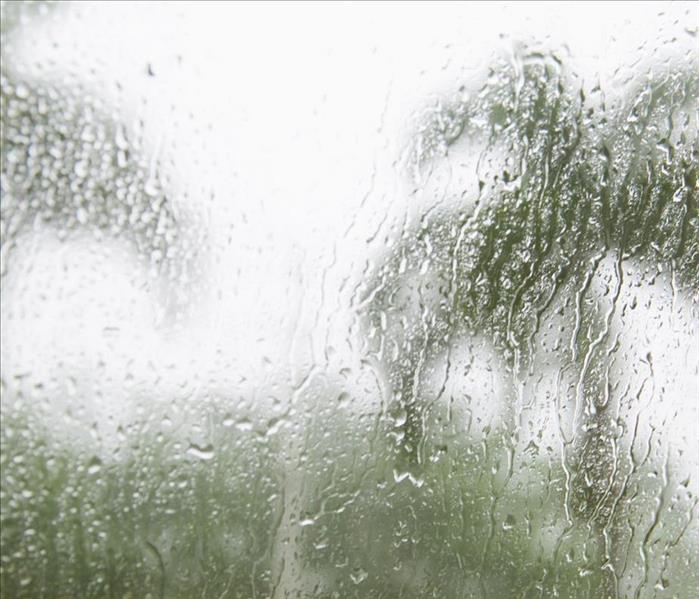 Call SERVPRO for fast and efficient service.
Call SERVPRO for fast and efficient service.
Trust Storm Flood Damage Assistance from SERVPRO
Anyone along the coast knows that storm fronts may wreak havoc on a home or business. SERVPRO is available 24/7 to help pick up the pieces from tropical storms and significant weather events that lead to exterior storm water flooding your interior. With our skilled water restoration technicians (WRT) and proven methods, we make it “Like it never even happened.”
Disaster response is imperative for any home or business owner. SERVPRO is here 24/7 to ensure all area customers get the prompt attention they deserve. Some of the attractions to enjoy in Fort Lauderdale include incredible dining, shopping, nightlife, and more, such as:
- Las Olas Boulevard: Chock full of amazing shopping, dining, and entertainment options, Las Olas Boulevard is a must for anyone visiting the area. You will find lovely art galleries, fashion boutiques, and sidewalk cafes where you can relax and enjoy a bite to eat. There are also several bars and cool breezeways where you can shake off a bit of the midday sun.
- Butterfly World: Experience over 20,000 live butterflies when visiting this fantastic attraction. This is the largest butterfly park in the world, including hundreds of exotic birds, a bug zoo, and breathtaking botanical gardens and waterfalls. If you are looking for a memorable outing with someone special or adventure with the kids, this is the place to visit.
SERVPRO of Ft. Lauderdale North is here whenever you require storm cleanup and flood damage restoration. Call us at (954) 417-7074 or request help online at your earliest convenience.
Water Damage Restoration from Severe Weather in Fort Lauderdale
4/16/2023 (Permalink)
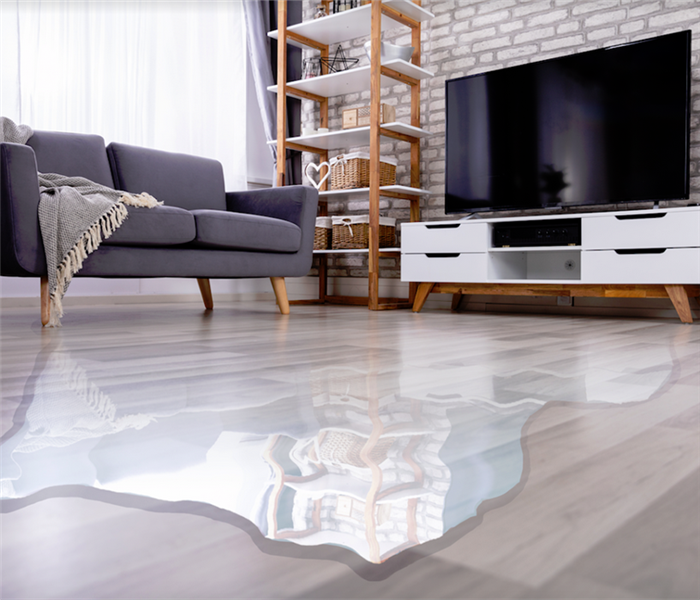 When flooding brings excess water into your home, team SERVPRO can help. Contact our technicians 24/7 - 365 days a year for effective services.
When flooding brings excess water into your home, team SERVPRO can help. Contact our technicians 24/7 - 365 days a year for effective services.
What Restoration Is Necessary After Flooding?
Storm damage and flooding are a persistent threat in the coastal homes and even condominiums of the Fort Lauderdale area. We know the damage that nature can do to structures, so we have a disaster relief team and a Large Loss response unit to help secure homes immediately with board-up, tarping, and mitigation.
The Earliest Efforts to Secure Your Home
Mitigation is a case-by-case situation for water damage restoration in Fort Lauderdale homes. Severe storm systems can leave homes compromised by the elements, letting floodwater into the main living spaces. We must work fast to address these concerns with mitigation strategies like:
- Water Removal - We eliminate standing water in the living space using extractors and vacuums.
- Debris/Muck-Out Cleaning - We remove contaminated debris and muck from the structure using hand tools and vacuums. After removal, we can better assess the condition of the building materials and what controlled demolition is necessary.
- Content Removal - We remove flood-damaged contents from the structure. Anything we can save is moved to our nearby warehouse for restoration and storage.
Removing Ruined Materials
Controlled demolition is a necessary component of flood recovery. Contamination cannot be overcome with porous materials like drywall and carpeting, making it essential to pull out these ruined elements for replacement.
Thorough Drying Solutions for Your Home
Even though many porous materials require removal after exposure to contaminated floodwater, our responding professionals must also have suitable drying solutions to help. We have air movers and dehumidifiers to manage surface water concerns and the humidity in affected rooms. The combination of these tools accounts for much of the drying effort in the house.
Post-storm water damage restoration can take many forms. When flooding is a concern for your home, the prompt arrival of experienced recovery technicians like our SERVPRO of Ft. Lauderdale North team helps to keep your cherished belongings and structure as safe as possible. Call our rapid responders at (954) 734-1006.
The Impacts of Flood Damage on a Fort Lauderdale Home
11/8/2022 (Permalink)
 SERVPRO provides fast and immediate storm damage restoration services; call now!
SERVPRO provides fast and immediate storm damage restoration services; call now!
SERVPRO Helps Minimize Damage after Fort Lauderdale Flood
A flooding event can be quite invasive. You should evacuate to higher ground immediately and avoid driving in flooded areas. Typically, one of the first things you would notice when you return to your house is the smell and physical deterioration of your belongings. The impact on your home depends on several factors. These include the type of flooding that has occurred, whether fast or slow-moving waters, the volume involved, and the duration your house has been submerged.
Addressing flood damage quickly in Fort Lauderdale properties is the best course to take within 24 to 36 hours of the disaster. Contact a restoration services provider such as SERVPRO as soon as possible. SERVPRO immediately dispatches restoration technicians to your home who takes you through the expected restoration process and answers any question you may have. If it is still raining, we temporarily patch any holes or breaches in your ceiling and walls to keep as much extra water out of your house as possible.
Ways flooding can affect your home include:
- Sewage and bacteria
- Damaged electrical and natural gas lines
- Emergence of sinkholes
- Mold development
The invading water can hide dangerous debris, like glass or metal fragments, mostly if muddy. Additionally, the water can displace animals, insects, and reptiles. It may also contain sewage, dead animals, and chemical hazards, not forgetting the electrical circuitry throughout your home, which might be below the water line. Submerged outlets, appliances, and electrical cords can put you at risk of electrical shock. With training, tools, and availability of safety equipment, SERVPRO crews can manage such situations well.
Noticeable structural changes after inundation
- Doors swell and jam
- The drywall swells and becomes fluffy
- Furniture joints loosen
SERVPRO of Ft. Lauderdale North has the resources to respond to any flood damage situation “Like it never even happened.” Call us at (954) 734-1006.
Finding Where Flood Damage Enters Fort Lauderdale Homes
8/13/2022 (Permalink)
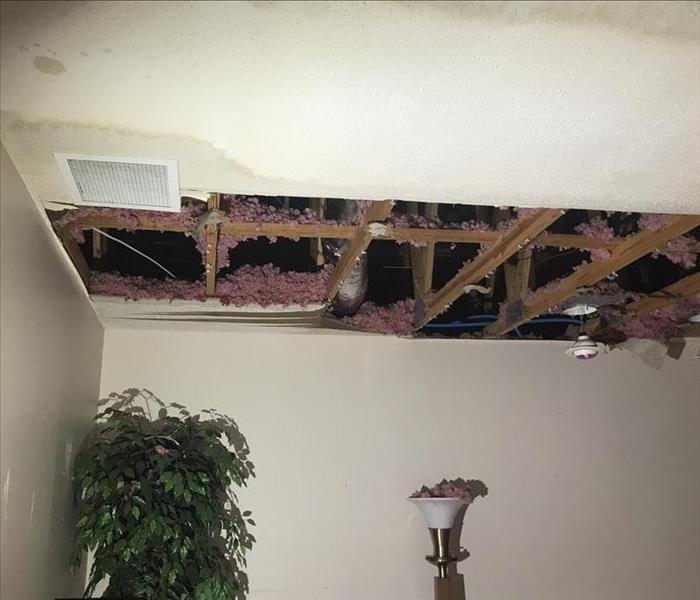 We're Faster To Any SIze Disaster. Call SERVPRO to mitigate storm damage to your Fort Lauderdale home. We do attics.
We're Faster To Any SIze Disaster. Call SERVPRO to mitigate storm damage to your Fort Lauderdale home. We do attics.
Stopping Flood Damage Entering the Property
Flooding can be among the more challenging situations that a home faces, making it a condition that restoration professionals must rapidly respond to resolve. SERVPRO is equipped, licensed, and certified to help in all facets of flood recovery, such as:
- Extraction
- Water cleanup
- Surface disinfection
- Thorough drying
- Repairs
Structural Openings of Main Floor
Flood damage in Fort Lauderdale homes can often occur directly, powering through doorways and openings in the structure. With these events like flash floods, the main floor of the property can be quickly overrun with standing water concerns. We have powerful extractors to help regulate these emergencies, allowing cleaning and drying to begin.
Flooding in the Attic
Roof damages during severe weather the Ft. Lauderdale area experiences can create penetration points in the roof with missing shingles or structural compromise. Water intrusion reaches the connected attic space, requiring low-profile air movers and portable extraction solutions to dry and clean.
Backed Up Drain Intrusions
Floor drains, especially those tied to areas like a garage, can be a point where backup impacts the house. Sewer systems become overrun with water or a blockage, which can occur during flash flooding and severe weather events. Drains feeding into this system can backup to spilling contents in connected areas of the house, even through toilets and other installed fixtures on lower levels.
Driven Water Damage
Heavy rains and strong winds can push rain against vulnerable areas of the house. Most commonly, this is a penetration between siding and the main exterior wall system of the residence, allowing water into the living space. Resolving this requires drying out any structural elements creating this assembly and flooring materials within the house that have been impacted.
Understanding how flood damage impacts your home or business prepares property owners to secure professional services after disasters. Our SERVPRO of Ft. Lauderdale North team has a fast storm damage response team for disaster relief and complete restoration. Call now at (954) 734-1006.
Steps To Protect Your Property During A Hurricane
3/9/2021 (Permalink)
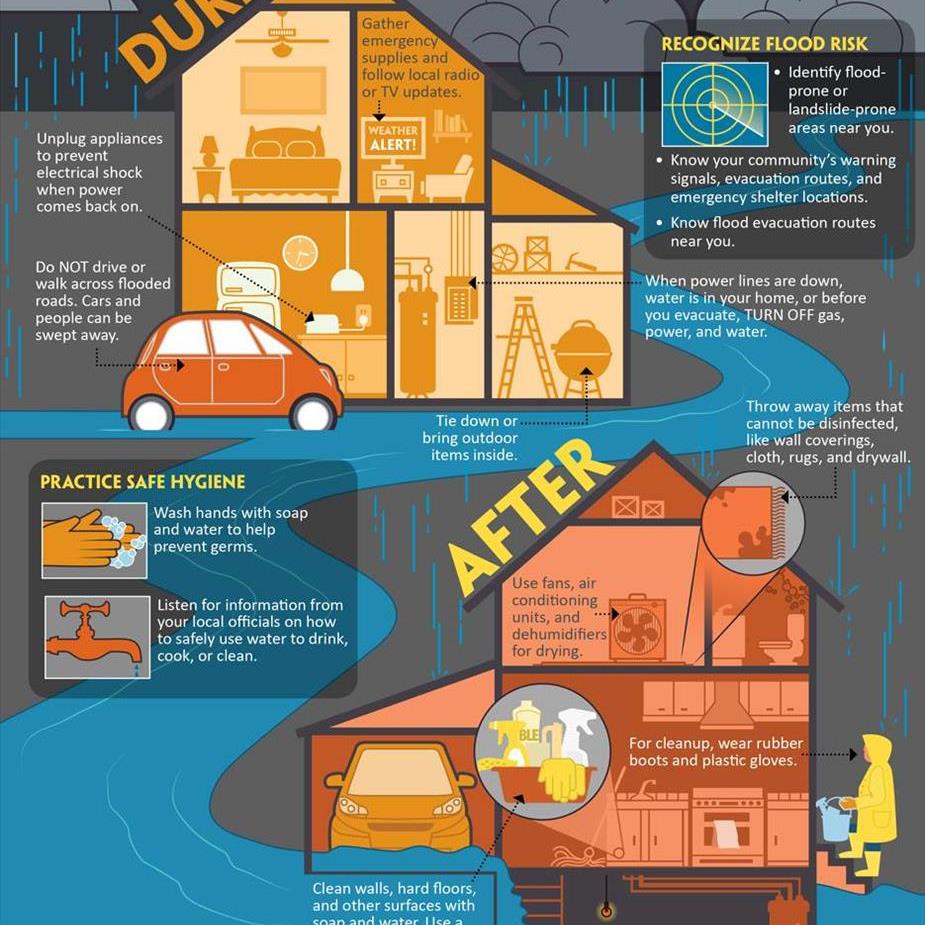 The Stages of Water Damage from Flash Floods and How to Handle them
The Stages of Water Damage from Flash Floods and How to Handle them
Steps To Protect Your Property During A Hurricane
A hurricane emergency can strike at any time, especially in the Ft. Lauderdale area. Unfortunately, hurricanes and tropical storms are a regular part of life on the coast. For homeowners that means being prepared and protecting your home and property from storm related damage.
There are steps you can and should take ahead of time to prepare for hurricane season, which generally extends from the end of August through October and sometimes beyond, but there may be times when you have less warning and you may need to move quickly to protect your home.
Here are a few steps you can take during a hurricane emergency:
- Guard against wind damage – Strong winds are one of the biggest threats posed by hurricanes and they can do a considerable amount of damage to your home. You should always be sure your gutters are clear and make any needed structural repairs. Aside from that, you can guard against wind damage by using safety measures such as roof straps, head and foot bolts on doors and window covers or storm shutters. Also, put caulking around windows and doors and check your drains and sump pumps to avoid water damage. You’ll also want to protect any attached structures like porches, decks and carports to be sure they’re stable and take in any outdoor furniture to prevent it from becoming a dangerous projectile.
- Check your landscaping – It’s not just your house itself that can be damaged during a hurricane. Make sure there are no loose tree branches and tie down any shrubs that might get pulled up so they can’t be blown through windows or walls. If you have a gravel driveway or walks, you might also want to consider changing to shredded bark, which is much less destructive when blown.
- Review your insurance – It’s too late to change your coverage during a hurricane emergency, but you’ll want to review the insurance you have so you know where you stand. That way you won’t face any surprises when it comes time to file a claim.
- Take photos – Having a thorough record of the current status of your home before the storm hits will be invaluable when you need to file an insurance claim. Keeping a comprehensive set of photos of your home, inside and out, will help with taking inventory, something that most insurance companies require.
Of course, it is not always possible to avoid damage during a hurricane emergency, but if you do face repairs and restoration you don’t have to go it alone. One of the most important steps you can take to protect your property is to consult with a professional restoration company. The professionals will be able to assess your damage and help to get your home back to normal as quickly and smoothly as possible.
As a part of the Ft. Lauderdale North community, SERVPRO is keenly aware of the potential dangers of a hurricane emergency and our technicians are ready to respond to your call immediately. With thorough training and state-of-the-art equipment, we’re prepared to handle any of your water mitigation and restoration needs. We’ll even help you file your insurance claim because we know how complicated and difficult that process can be.
When a hurricane emergency strikes, you can rely on SERVPRO to get you back on your feet in no time. We can make rebuilding after a storm a lot less stressful for you and your family because we treat your home as if it were our own.
About the Author
Tyrone Po
Facebook
Twitter
Youtube
Instagram
Linkedin
We understand the challenges that can happen 1st hand (I have experienced them myself) and how we can help you get things back to normal.
Affiliations: We are affiliated with Professional Golfers' Association of America, American Red Cross, Better Business Bureau, BOMA, Community Association Institute, Ft Lauderdale Chamber of Commerce, Independent Agents of Broward County, Institute of Inspection, Cleaning and Restoration Certification, Lauderdale by the Sea Chamber of Commerce, Leadership Broward, Plantation Chamber of Commerce, South Florida Claims Association, Wilton Manors Business Association
Certifications: AMRT - Applied Microbial Remediation Technician, ASD -Applied Structural Drying Technician, CCT - Carpet Cleaning Technician, ECTP -Employee Certification Training Program, FSRT -Fire & Smoke Damage Restoration Technician, UFT - Upholstery & Fabric Cleaning Technician, OSHA - 10-hour General and/or Construction Industry Training Program, HST -Health and safety Technician, OCT - Odor Control Technician, RRRP -Lead-Based Paint Activities and Renovation, WRT -Water Damage Restoration Technician, IICRC -Certified Firm
Awards: Better Business Bureau - A Rated, Greater Fort Lauderdale Chamber of Commerce Small Business Award Recipient
Check out our previous blog!
Is Your Ft. Lauderdale Property Damaged by Storm Floods or King Tides?
Unusual Problems That Hurricanes Can Cause For Your Property
3/4/2021 (Permalink)
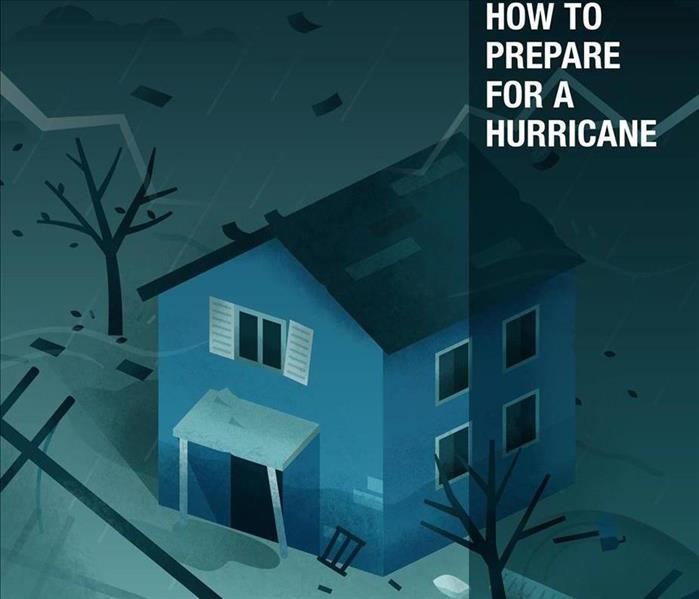 Hurricane/Storm Water Damage is better handled by the professionals!
Hurricane/Storm Water Damage is better handled by the professionals!
Unusual Problems That Hurricanes Can Cause For Your Property
Life is good in Ft. Lauderdale with its sunny beaches and beautiful homes but it can also hold hidden hurricane dangers for homeowners. Located on the southern coast of Florida, Ft. Lauderdale is a traditional spring break location and a draw for snowbirds eager to soak up the year round warm weather. Unfortunately, its coastal location also puts it in the danger zone for hurricanes and tropical storms.
With high winds and heavy rains, hurricanes are among the most devastating natural disasters. Because they tend to hit the Florida coast regularly, it pays for residents here to be prepared for the potential damage hurricanes may cause. Most homeowner’s policies cover hurricane related damage, but it may be necessary to carry extra coverage for flooding.
When most people think of hurricane damage, they probably picture ripped up roofs and waterlogged basements. While those are certainly common results of severe storms there are other hidden hurricane dangers that you may not necessarily have considered. But it is important to be prepared for any potential issues to keep your property protected.
Here are some hurricane related hazards that could threaten your Ft. Lauderdale home:
- Storm Surge – Because hurricanes originate over the water and move inland the strong winds they contain can push water toward the shore. This is called storm surge and is one of the most prominent hurricane related hazards, especially when it coincides with regular high tides. When excess water moves toward shore it has nowhere to go but inland and that can cause severe flooding and may even be powerful enough to wash away parts of buildings or even entire homes.
- Flash Flooding – Hurricanes can also cause inland flooding and if rainfall or storm surge amounts are large enough that can lead to flash flooding. As waters rise, they can wash away buildings, trees and other debris and possibly direct debris into your property. Rising waters can also cause severe erosion, which can undermine your foundation.
- High Winds – Another severe hazard related to hurricanes are high winds. Hurricanes are classified by their wind speed and winds can reach well over 100 mph. In some cases, hurricanes can also trigger tornadoes, one of the more destructive hidden hurricane dangers a home owner can face. Strong winds can damage roofs and even remove them entirely and they can turn common objects into dangerous projectiles that can cause property damage on impact. These high winds can even damage surrounding landscape, which can in turn lead to problems for your property.
When hurricane damage occurs it can seem devastating, but you are not alone. There are resources you can turn to in order to get your home back to normal, starting with the professionals at SERVPRO of Ft. Lauderdale North. We have the training, expertise and equipment to handle any problem, big or small, and as part of the Ft. Lauderdale community ourselves we understand what it’s like to rebuild after a hurricane strikes.
We’re ready to respond immediately, 24 hours a day and we’ll even help you deal with your insurance company so that you can get back to living the good life. So if you suddenly find yourself dealing with hidden hurricane dangers, be sure to call SERVPRO and let the professionals take good care of your home.
About the Author
Tyrone Po
Facebook
Twitter
Youtube
Instagram
Linkedin
We understand the challenges that can happen 1st hand (I have experienced them myself) and how we can help you get things back to normal.
Affiliations: We are affiliated with Professional Golfers' Association of America, American Red Cross, Better Business Bureau, BOMA, Community Association Institute, Ft Lauderdale Chamber of Commerce, Independent Agents of Broward County, Institute of Inspection, Cleaning and Restoration Certification, Lauderdale by the Sea Chamber of Commerce, Leadership Broward, Plantation Chamber of Commerce, South Florida Claims Association, Wilton Manors Business Association
Certifications: AMRT - Applied Microbial Remediation Technician, ASD -Applied Structural Drying Technician, CCT - Carpet Cleaning Technician, ECTP -Employee Certification Training Program, FSRT -Fire & Smoke Damage Restoration Technician, UFT - Upholstery & Fabric Cleaning Technician, OSHA - 10-hour General and/or Construction Industry Training Program, HST -Health and safety Technician, OCT - Odor Control Technician, RRRP -Lead-Based Paint Activities and Renovation, WRT -Water Damage Restoration Technician, IICRC -Certified Firm
Awards: Better Business Bureau - A Rated, Greater Fort Lauderdale Chamber of Commerce Small Business Award Recipient
Check out our previous blog!
What Type of Clean Up Should You Expect After A Hurricane In Ft. Lauderdale?
What Type of Clean Up Should You Expect After A Hurricane In Ft. Lauderdale?
1/27/2021 (Permalink)
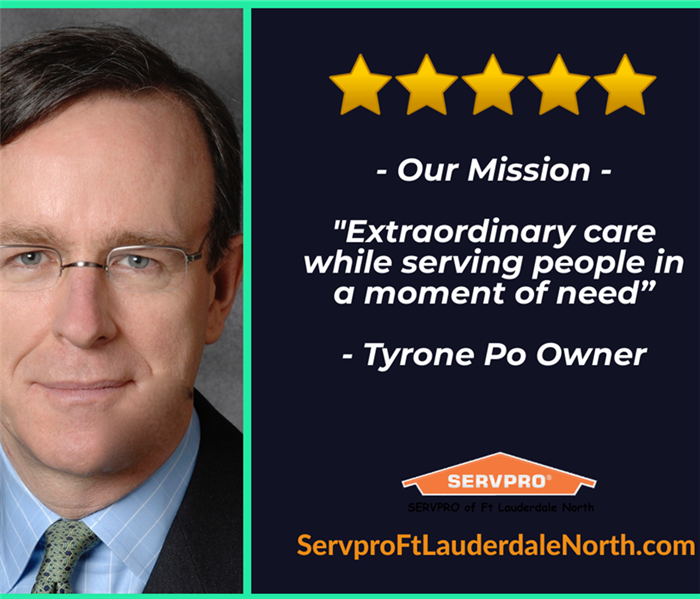 We will help you in any disaster
We will help you in any disaster
Hurricanes can strike without much notice in the Ft. Lauderdale area and that means homeowners have to be ready to deal with the damage that can occur during these severe storms.
High winds, heavy rains and storm surges can all take a heavy toll on your home, leaving you with a cleanup process that may seem overwhelming.
The cleanup after a hurricane can be a devastating time, both emotionally and physically
The wind and rain of hurricanes can result in everything from damaged roofs to water logged basements.
Trees, branches and common outdoor items like trash cans and patio furniture may become dangerous projectiles, which can damage the outside of your home.
Heavy rain and storm surge can lead to flooding, leaks and mold buildup
Fortunately, you don’t have to face this difficult cleanup process alone.
The professionals at SERVPRO of Ft. Lauderdale North have the training, expertise and equipment to handle even the toughest cleanup.
We can:
- clear fallen branches,
- repair damaged roofs,
- remove standing water and
- provide thorough mold remediation so that you and your family can literally breathe easier
With teams available 24 hours a day, we’re prepared to respond faster to any disaster and we can even help you deal with your insurance company so that you are sure you’re getting the help you need.
So don’t let that hurricane cleanup overwhelm you, just call SERVPRO and let our professionals get your house back to normal again.
Unusual Problems That Hurricanes Can Cause For Your Property
11/27/2020 (Permalink)
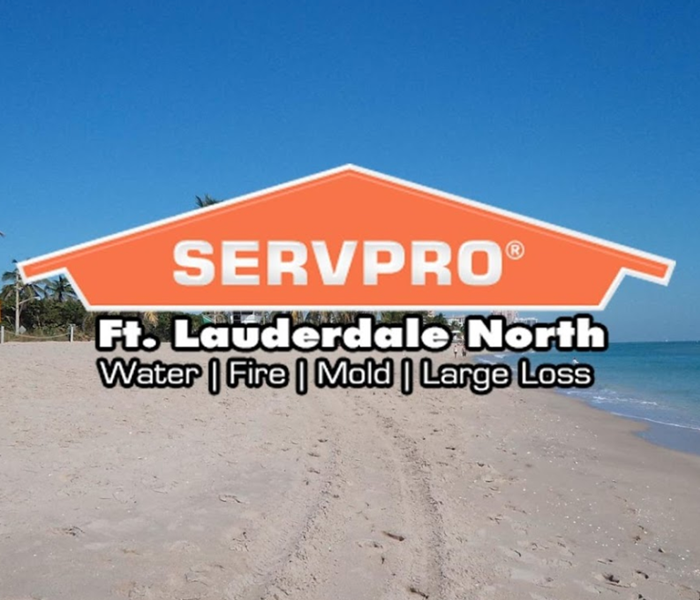 Most times sunshine... Some times storms...
Most times sunshine... Some times storms...
Life is good in Ft. Lauderdale with its sunny beaches and beautiful homes but it can also hold hidden hurricane dangers for homeowners.
Located on the southern coast of Florida, Ft. Lauderdale is a traditional spring break location and a draw for snow birds eager to soak up the year round warm weather.
Unfortunately, its coastal location also puts it in the danger zone for hurricanes and tropical storms
With high winds and heavy rains, hurricanes are among the most devastating natural disasters. Because they tend to hit the Florida coast regularly, it pays for residents here to be prepared for the potential damage hurricanes may cause. Most homeowner’s policies cover hurricane related damage, but it may be necessary to carry extra coverage for flooding.
When most people think of hurricane damage, they probably picture ripped up roofs and water logged basements. While those are certainly common results of severe storms there are other hidden hurricane dangers that you may not necessarily have considered.
But it is important to be prepared for any potential issues in order to keep your property protected
Here are some hurricane related hazards that could threaten your Ft. Lauderdale home:
- Storm Surge – Because hurricanes originate over the water and move inland the strong winds they contain can push water toward the shore. This is called storm surge and is one of the most prominent hurricane related hazards, especially when it coincides with regular high tides. When excess water moves toward shore it has nowhere to go but inland and that can cause severe flooding and may even be powerful enough to wash away parts of buildings or even entire homes.
- Flash Flooding – Hurricanes can also cause inland flooding and if rainfall or storm surge amounts are large enough that can lead to flash flooding. As waters rise, they can wash away buildings, trees and other debris and possibly direct debris into your property. Rising waters can also cause severe erosion, which can undermine your foundation.
- High Winds – Another severe hazard related to hurricanes are high winds. Hurricanes are classified by their wind speed and winds can reach well over 100 mph. In some cases, hurricanes can also trigger tornadoes, one of the more destructive hidden hurricane dangers a home owner can face. Strong winds can damage roofs and even remove them entirely and they can turn common objects into dangerous projectiles that can cause property damage on impact. These high winds can even damage surrounding landscape, which can in turn lead to problems for your property.
When hurricane damage occurs it can seem devastating, but you are not alone. There are resources you can turn to in order to get your home back to normal, starting with the professionals at SERVPRO of Ft. Lauderdale North. We have the training, expertise and equipment to handle any problem, big or small, and as part of the Ft. Lauderdale community ourselves we understand what it’s like to rebuild after a hurricane strikes.
We’re ready to respond immediately, 24 hours a day and we’ll even help you deal with your insurance company so that you can get back to living the good life
So if you suddenly find yourself dealing with hidden hurricane dangers, be sure to call SERVPRO and let the professionals take good care of your home.
Is Pompano Beach Ready for Hurricane Season?
5/27/2020 (Permalink)
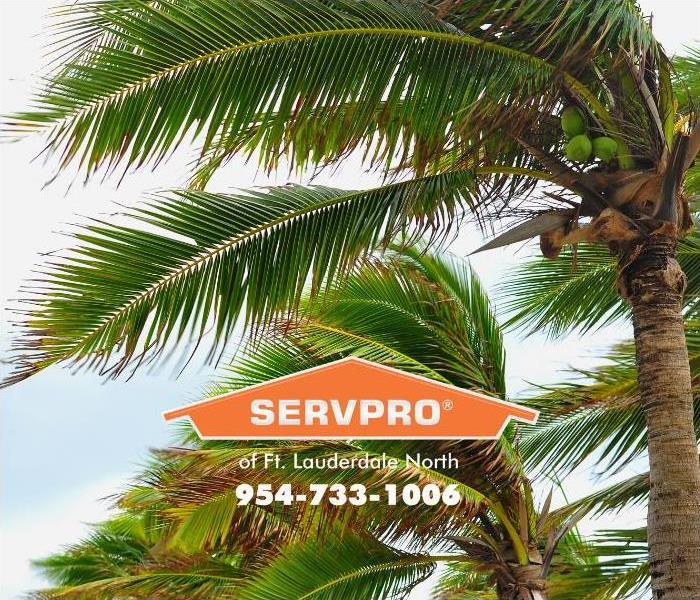 Our team is ready to respond to any storm damage emergency in Ft. Lauderdale.
Our team is ready to respond to any storm damage emergency in Ft. Lauderdale.
First Named Storm of the Season
The first named Atlantic storm of the season, Tropical Storm Arthur, came weeks ahead of the official start of Hurricane season. This is the sixth year in a row that a named storm has come ahead of the official June start to Hurricane season, causing many meteorologists to think of assigning May as the start of Hurricane season. During storm season, strong winds will whip water through the many canals in Ft. Lauderdale causing flooding and other property damage. SERVPRO® of Ft. Lauderdale North wants the residents and business owners of Pompano Beach to know that we are ready to respond to any size storm emergency.
Disaster Recovery Team
When a major storm occurs, we are uniquely positioned to combine resources with other SERVPRO franchises to pool equipment, personnel, and resources that could overwhelm another restoration company. We also have access to Disaster Recovery Teams that are strategically placed across the U.S. that can be quickly and cost effectively mobilized to disaster locations. Some examples of the types of clients we serve through this program include:
- The Hospitality Industry
- Property Managers
- Universities
- Municipalities
- The Pentagon
Call Us Today
No matter type of storm damage you may experience, SERVPRO® of Ft. Lauderdale North wants to help. We will restore your storm damage in Pompano Beach “Like it never even happened.” Call us today at 954-733-1066.
SERVPRO® of Ft. Lauderdale North is Independently Owned and Operated.
Checklist For Preparing For A Flood in Ft Lauderdale
3/20/2020 (Permalink)
 When it floods... be prepared with a solution, step by step
When it floods... be prepared with a solution, step by step
Checklist For Preparing For A Flood
Flooding is the most common form of natural disaster in the U.S. and it can happen anywhere at any time
Your odds for surviving a flood can increase dramatically if you know what to do and take the proper steps not only ahead of time, but also during the flood itself and afterward.
Don’t wait until disaster strikes to start acting; the sooner you begin to prepare the better off you, your home and your family will be.
There are several types of flooding that can strike a given area, from slow onset to flash floods. In the case of flash floods, that occur quickly when a levee or dam breaks, there may be little time to prepare. This is why taking steps ahead of time, before disaster strikes, is so vitally important.
Before The Flood Strikes
It is important to take certain steps well before any type of emergency, while you still have a clear head and have the time to be thorough.
In some areas, the chances for flooding can be greater at certain times of the year, so knowing when the flood season is should be your first step in disaster preparation.
Here are other important steps to take ahead of a flood:
- Know Your Risk – do some research to determine exactly what your risk is for flooding.
Even if your home isn’t located in a high-risk area, you should still be prepared. According to the National Flood Insurance Program (NFIP), 25% of all flood claims each year come from homes that aren’t in high-risk areas.
- Stay Informed – Getting up to the minute weather reports and emergency warnings can mean the difference between life and death. Local news and community emergency notification systems can give you vital information.
You should also have a National Oceanic and Atmospheric Administration (NOAA) weather radio that works with a hand crank or have extra batteries for it in case of a power outage.
- Know Evacuation Routes – evacuating the area is generally the best way to stay safe when a flood hits. You should have a clear inland route that stays away from bridges or bodies of water and all members of your family should be aware of it.
If you can, you should drive that route during good weather to become more familiar with it.
- Plan For Relocation – it may be necessary to remain away from home for some time until floodwaters recede, so you’ll need a safe place to go for temporary shelter.
Either make plans to stay with family and friends outside of the area or learn where your local American Red Cross shelters are so you can get to safety quickly.
- Have A Communication Plan – You may be separated from your family members when an evacuation order is issued, so you should know beforehand how to communicate with each other in this case.
When emergencies strike phone lines can quickly become jammed so texting is usually a quicker and more secure way to communicate.
Keep important phone numbers written down in your wallet as well as on your phone so you’ll be able to communicate in any eventuality.
- Know Your First Aid Skills – It may be necessary to provide emergency first aid if first responders can’t get to you right away, so you should get training to administer First Aid and CPR.
Have a well-equipped first aid kit handy so you’ll have any emergency supplies you might need. The Community Response Team (CERT) Program provides training in basic response skills such as fire safety and light search and rescue.
- Make An Emergency Kit – You should put together a “Go Bag” with important supplies that you can grab quickly as you evacuate.
When compiling your bag, remember the “5 P’s”:
- People – you, your loved ones, and when possible, your pets should come first.
- Prescriptions – make sure you have all of your medications as well as dosage information, any other necessary medical equipment, eyeglasses and hearing aids.
- Papers – keep hard copies and electronic copies on hard drives or thumb drives of all important documents.
- Personal needs – be sure to include clothes, toiletries, food, water, first aid kit, phones and chargers, batteries, and any items needed for individuals with special needs, the elderly or infants.
- Priceless items – include pictures, irreplaceable mementos, and any other valuables.
- Don’t Forget Important Documents – You’ll want to have all of the necessary documents to begin making an insurance claim, including your insurance policy, a complete list of your home’s contents and rental or mortgage agreements.
- Prepare Your Home – you can help mitigate damage by elevating the heating system and electrical panel, installing “check valves” in sewer lines, waterproofing your basement and installing a sump pump, keeping gutters and drainpipes clear, and stockpiling emergency equipment such as sandbags, plywood and plastic sheeting.
- Have A Family Plan – it’s important that every member of your family is aware of the proper flood preparation steps and what to do in an emergency so be sure to discuss it with everyone ahead of time.
Talking through your disaster preparation ahead of time can help to make everyone safer.
During The Flood
Most flood-related injuries and deaths stem from people becoming trapped. When flooding occurs you should pay careful attention to any evacuation orders and follow them carefully.
Don’t assume that you can handle the situation on your own; even a small amount of water can have deadly results so keep yourself and your family safe by following these steps:
- Evacuate– this is THE most important step to take. Just six inches of moving water is enough to knock you off your feet and a foot of water can sweep a vehicle away, so you should never risk trying to cross floodwaters. As soon as an evacuation order is issued, follow the route you’ve prepared and get to safety.
- Prepare Your House – if the flood is slow-moving and you have time to take emergency precautions, move any valuables you can’t take with you to higher ground; turn off the gas, water, and electricity if you can do so safely; put sandbags around your property to help stem the flow of water.
- Avoid Flood Water – if you see flood water, do not attempt to cross it. Even if it seems shallow, the ground underneath the water could be compromised which might present a greater danger.
Floodwaters can also contain other hazards such as rocks, mud, oil, debris and even venomous snakes.
- Know What To Do If You’re Trapped – if you become trapped by quickly rising water, call 911 and move to the highest level of the building you are in, avoiding closed attics as you could become trapped and only moving to the roof as a last resort.
If you’re in a vehicle and can turn around safely, do so, otherwise climb up onto the roof. If you’re outdoors, move to higher ground.
After The Flood
It can take several days for floodwaters to recede completely so don’t assume that you can get back into your home safely right away.
Even as the water recedes it can still contain hazards so you need to exercise caution. Here are the steps to take after a flood:
- Wait For The All Clear – do not attempt to return to your home until the authorities have declared it safe to do so. When you do return, don’t drive through floodwaters and be on the lookout for debris. Also, stay away from downed power lines.
- Enter Cautiously – even when you have been allowed to return to your home, you should proceed with caution as you don’t know what kind of damage has been done or what kind of dangerous debris the flood may have left behind.
- Don’t Wade In Floodwater – even as floodwater recedes, it can still be dangerous so you should avoid wading through it. Floodwater can be contaminated with gas, oil or even raw sewage so it should be treated as a hazard.
- Take Personal Safety Precautions – be particularly careful to protect yourself from health hazards such as mold, asbestos, electrical shock, and lead paint.
Wear protective clothing when beginning the cleanup process, including respiratory masks and goggles.
- Don’t Touch Electric or Gas Sources– turn off the electricity in your house and call a licensed electrician to make any repairs or turn the power back on. Contact your utility company to turn the gas main back on.
- Remember Fire Safety – use flashlights in homes without power rather than any source of light with an open flame, like torches, lanterns or matches, as these can be a fire hazard.
- Only Use Generators Outside – Remember that carbon monoxide discharge from generators can kill, so only use generators outside and away from windows.
- Service Damaged Septic Systems – damaged sewer or septic systems can be a serious health hazard so get any damage repaired as quickly as possible.
- Don’t Eat or Drink – have wells checked for contamination and check with local authorities to find out when it’s safe to use tap water. Also, throw out any food that did not stay at a proper temperature or was exposed to floodwaters and don’t eat from flooded gardens.
- Clean Carefully – Clean and disinfect anything that got wet, using proper protective measures including gloves, goggles, and masks. In order to assure proper clean up follow five basic steps: air out, move out, tear out, clean out and dry out. For any cleanup that is beyond your capabilities, call a disaster relief company.
- Check the Structure – use a moisture meter to ensure that all wood studs and framing are sound; remove any damaged drywall or paneling. Make sure everything is thoroughly dry before replacing drywall to avoid mold growth.
- Take Photos – your insurance company will require photographic evidence of the damage so make sure you get plenty of photos of everything before you start repairing.
- Mitigate Damage Not Covered By Insurance – take any necessary steps to mitigate damage that your insurance policy won’t cover, such as putting a tarp on a damaged roof or boarding up windows.
- Stay In Communication – in the immediate aftermath of a flood, stay up to date with local information sources to get any alerts or information. Remember to use texts or social media to communicate with family members as phone lines can become overwhelmed.
- Look Out for Loved Ones – the stress of dealing with this kind of emergency can take a toll on you and your loved ones. Be aware of any signs that you or your loved ones are becoming depressed or anxious and if you need it, seek professional help.
See what wood floor water damage looks like.
Please have a look at what other clients are saying about our help...
Bring Your Pets When You Have to Evacuate Your Plantation Florida Home
11/27/2019 (Permalink)
 Bring your pets with you when you have to evacuate your home
Bring your pets with you when you have to evacuate your home
Hurricanes and other severe storms can make Wilton Manor unsafe for its residents. If people must evacuate, the pets have to go too. SERVPRO® of Ft. Lauderdale North hopes you can use these tips from the Federal Emergency Management Association (FEMA).
Before a Storm Strikes Wilton Manor:
- Make sure the information on pets' tags is current
- Rabies tags
- Consider a microchip for the pet
- In case you and your pet(s) are separated, have photos of yourself with each pet
- Know where to find pet-friendly motels and shelters
- Lists of all medications and conditions
- Comfortable and secure carrier for each pet
- For pets that can be leashed: leash or harness for each animal
- Copies of all prescriptions
Emergency Kits for Pets
- Proof of vaccinations, veterinary records
- At least a 3-day supply of food and water for each pet
- Pet first-aid kit
- Treats and toys, especially favorite ones
- Familiar blankets or other bedding
- Something that smells like you (old t-shirts are good)
- Enough medication for 3 or more days
- Rx and other medications
If you want more information, SERVPRO of Ft. Lauderdale North recommends the Red Cross website.
Storm damage and water damage do not have to ruin your home. SERVPRO of Ft. Lauderdale North can remediate damage “Like it never even happened.” We are available 24/7.
SERVPRO of Ft. Lauderdale North is independently owned and operated.
Link: https://www.fema.gov/helping-pets
Hurricane Preparation and Boarding Your Windows in Wilton Manors
10/14/2019 (Permalink)
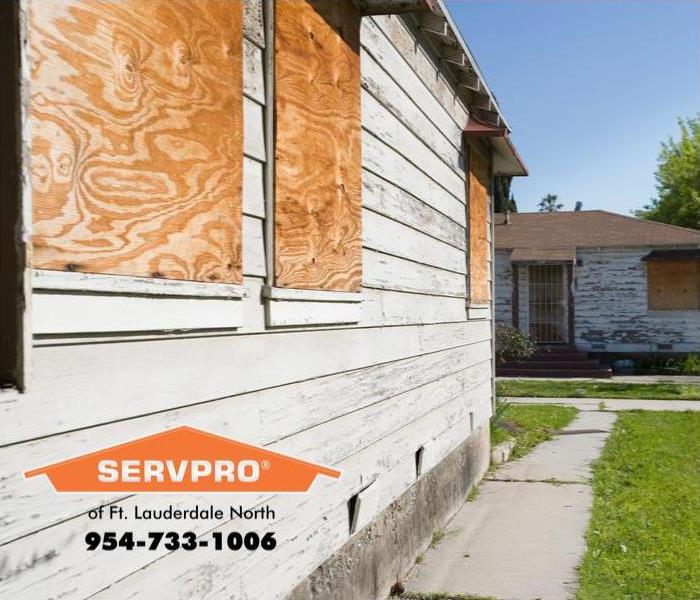 Boarding your windows can prevent further interior damage
Boarding your windows can prevent further interior damage
If you are familiar with hurricanes, you know this kind of stormy weather includes heavy winds, a lot of water, and the potential to be extremely dangerous. SERVPRO of Ft. Lauderdale North wants to remind you that there are many ways to prepare for a hurricane, including finding a secondary shelter for safety, making sure you have plenty of bottled water and non-perishable foods, extra clothing and hygiene products, etc. If you have time before facing a hurricane it is important to try and board up your windows and all other glass areas throughout your house.
Heavy winds can send objects flying, which can result in your windows, skylights, and sliding glass doors to be blown out – if this happens, plan on dealing with broken glass spread throughout your home as well as the water that gets in as a result of the storm damage.
When preparing, make sure you measure out the correct amount of wood you will need to cover all glass areas. One tip (if time permits) is to paint the wood with an exterior primer and paint to prevent moisture damage. Secure the wood with galvanized screws and make sure your safety plan is in place. Hurricanes frequent Fort Lauderdale, and SERVPRO wants you to stay as safe as possible. In the event that a hurricane does create some disaster, know that you can count on our services, especially if you have storm damage inside your home.
2019 Hurricane Ready Tips
9/9/2019 (Permalink)
Hurricane Ready this Year
Even with Dorian just passing by the South Florida area, 2019's hurricane season isn't in the clear yet. Florida residents should still be prepared and ready for any disaster. SERVPRO of Ft. Lauderdale North is here to help with these 2019 hurricane ready preparation tips.
- Be sure to withdraw cash from your bank account before the storm as some banks can be closed for days until power is restored.
- Invest in a battery powered or hand crank radio to stay up-to-date on what's going on in your area.
- If you can't stay with friends or family outside of evacuation zones, be aware of your nearest hurricane shelter, and overnight kennels for your furry friends.
- Having a few camping lanterns will come in handy in the event of any power failures.
- Fill your vehicle's gas tank and any gas cans ahead of time.
- Before a storm hits be sure you've stocked up on clean drinking water or bottled water- one gallon per person per day for no less than three days.
- Fill large freezer bags with water and freeze them with your freezer turned to its coldest setting. If the power goes out, you'll have blocks of ice to preserve things in the fridge and coolers.
- Unplug TVs, computers, and appliances before the storm to avoid damages to electronics.
- Consider boarding up your house and going out of town until officials in your area say it's safe to return.
Being Hurricane Ready is the most important skill for a south Florida family. Your hurricane preparation should be complete well before a storm hits. The American Red Cross has a complete hurricane preparation checklist available here. SERVPRO of Ft. Lauderdale North hopes you have a safe and damage-free storm season, but should disaster strike, SERVPRO of Ft. Lauderdale North will arrive "faster to your disaster" and make it "like it never happened."
Give us a call at (954) 733-1006 or visit our website at http://www.SERVPROftlauderdalenorth.com/
Follow us on Social media: SERVPRO of Ft. Lauderdale North
Facebook: https://www.facebook.com/SERVPROFtLauderdale/
Instagram: https://www.instagram.com/SERVPROheroftlnorth/
Don't Be Afraid of Dorian - Be READY for it.
8/28/2019 (Permalink)
When the Storm Rains Down, we’ve got you covered.
Dorian is the first named storm of the season that looks like it will impact Florida. Although we don’t know what route it will take, it is always a great idea to be prepared for not only the before, but also for the after.
We’ve put some tips together to help you prepare for this year’s hurricane season. They come in the form of videos and articles that really dive into what to do before, during and after the storm. We’re also here as a resource for both knowledge and for services to help you recover after the disaster. We hope Dorian doesn’t bring the harsh weather to us, but we’d rather you be a warrior in times of peace than a gardener in the times of war.
From Water Damage due to flooding after Dorian arrives, to the mold damage that may occur due to potential moisture soaking into your home, we will arrive faster to any disaster. Fire damage is also an important consideration during these types of events because many things can cause fires. Lighting strikes to down power lines, there is always potential for danger. If your home is affected by a fire, we’ll be at your service to bring things back to normal the best that we can. Dorian doesn’t scare us, and we want you to be prepared and ready, so it doesn’t scare you either!
The link below will take you to our website where you can watch several video’s that address key aspects of getting prepared including insurance review, how to put a hurricane kit together, an evacuation zones. We also provide articles that give you power in the form of knowledge to face this foe of a storm now formally known as Dorian.
Catch our latest storm preparedness videos here.
View our articles about storm preparedness and other mold, fire or water damage topics here.
You've got the support, always here to help.
We've supported hundreds of families and businesses like yours before. You are not alone. Whether reactive or preventative, our team can jump into action to make sure things are a success.
Give SERVPRO of Ft. Lauderdale North a call at (954) 733-1006 or visit our website at http://www.SERVPROftlauderdalenorth.com/
Follow our Social media for exclusive tips on dealing with mold, fires, water damage and more: SERVPRO of Ft. Lauderdale North
Facebook
Instagram
South Florida's Flooding
8/26/2019 (Permalink)
Flooding Tips
Florida’s hurricane season is one of the largest causes of flooding in South Florida, but if you are a Florida resident, you surely know that it doesn’t have to be hurricane season for your streets to be flooded.
As a peninsula, average thunderstorms can bring lots of rain and downpour leading to flooding in local communities like Hollywood, Pembroke Pines and Miramar. Some other areas like Weston and Delray have better suited streets that handle the flooding well. But no matter where you live in “Sunny” South Florida, you’ve had your fair share of driving through and having your home surrounded by rising waters.
Here are some general tips about the do’s and don’ts when dealing with flood situations wherever you are.
After the Flood:
- Gather your items, whether it be in your car or your home, get your items off the floor and to higher areas within home or vehicle. If that isn’t possible, get them out to somewhere safe and dry.
- Try to get out excess water in the area, whether it be on your floors or on your upholstery, try drying the area with a mop or with a towel to blot the wet spots or areas.
- If it is within your home, place something that is water resistant between the item and the floor. Aluminum or wood works well in this situation, especially for furniture.
- Turn on fans and the air conditioner (if they are unaffected by the water or moisture) to get the air flowing.
Do not do:
- Don’t leave your belongings to soak in the flood water. Flood water can be contaminated or dangerous. Materials like leather or paper will definitely become damaged beyond repair if left alone in the moisture.
- Books, papers, documents and anything cardboard will definitely rot if left soaking in water.
- Do not use standard home appliances if wet and don’t try to use a regular vacuum cleaner to pick up anything. Leave this to the professionals.
- Don’t turn on anything that could shake your environment. When flooding occurs, many aspects of your home may be structurally unsafe, so leave pieces of your home like your ceiling fan, OFF!
- If you feel your home or vehicle is unsafe because of the flood damage, do not stay there.
You've got the support, always here to help.
We've supported hundreds of families and businesses like yours before. You are not alone. Whether reactive or preventative, our team can jump into action to make sure things are a success.
Give SERVPRO of Ft. Lauderdale North a call at (954) 733-1006 or visit our website at http://www.SERVPROftlauderdalenorth.com/
Follow our Social media for exclusive tips on dealing with mold, fires, water damage and more: SERVPRO of Ft. Lauderdale North
Facebook
Instagram
2019 Hurricane Prep Tips for Your Wilton Manors Home
6/18/2019 (Permalink)
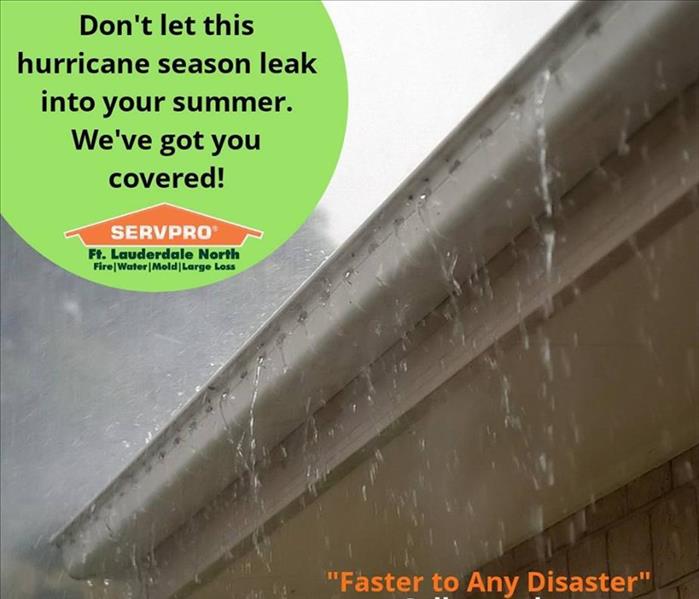 Hurricane Storm Damage? Call us now!
Hurricane Storm Damage? Call us now!
Hurricane season is stirring up a storm. As we are already getting hit with rains all the way from Oakland Park to even the Plantation area, 2019 hurricane preparation should be top priority for all Florida residents. If the weather leaves your home going "Ft. Lauderdale south" for a lack of a better pun, you shouldn't waste time in reaching out to SERVPRO of Ft. Lauderdale North. We're always ready to rescue you during your hurricane troubles.
Every year people's lives are affected by these major storms. (Look back to 2017!)
Even more so, here are some 2019 hurricane preparation tips.
2019 Hurricane preparation tips:
- Fill your car's gas tank and any extra gas cans ahead of time. If you live near water dense areas like Lauderdale by the Sea, things may go South very quickly and you may find yourself needing to quickly evacuate. In which case, you'd definitely need a full tank of gas.
- Having a few camping lanterns will come in handy in the event of any power failures. Not everywhere has underground power lines like the Weston area.
- Fill large freezer bags with water and freeze them with your freezer turned to its coldest setting. If the power goes out, you'll have blocks of ice to preserve things in the fridge and coolers.
- Before a storm hits be sure you've stocked up on clean drinking water or bottled water- one gallon per person per day for no less than three days.
- Invest in a battery powered or hand crank radio to stay up-to-date on what's going on in your area.
- Be sure to withdraw cash from your bank account before the storm as some banks can be closed for days until power is restored.
- Unplug TVs, computers, and appliances before the storm to avoid damages to electronics.
- If you can't stay with friends or family outside of evacuation zones, be aware of your nearest hurricane shelter, and overnight kennels for your furry friends. Check your city's main website for details on shelter locations. For example: https://www.fortlauderdale.gov/
- Consider boarding up your house and going out of town until officials in your area say it's safe to return.
Your hurricane preparation should be complete well before a storm hits. Hurricane preparation is the most important skill for a south Florida family.
The American Red Cross has a complete hurricane preparation checklist available here. SERVPRO of Ft. Lauderdale North hopes you have a safe and damage-free storm season, but should disaster strike, SERVPRO of Ft. Lauderdale North will arrive "faster to your disaster" and make it "like it never happened."
You've got the support, always here to help.
We've supported hundreds of families and businesses like yours before. You are not alone. Whether reactive or preventative, our team can jump into action to make sure things are a success.
Give us a call at (954) 733-1006 or visit our website at http://www.SERVPROftlauderdalenorth.com/
Follow our Social media for exclusive tips on dealing with mold, fires, water damage and more: SERVPRO of Ft. Lauderdale North
Facebook
Instagram
Post-Hurricane Mold: Aftermath of Florence
10/3/2018 (Permalink)
The 2018 hurricane season brought some surprises!
After a storm, your top concern, after you and your family's safety and well being, is damage done to your property. Flooding, leaky roofs, and busted pipes all account for water damage that can turn into a mold problem quickly. Mold issues after a big storm are not uncommon, even if you weren't aware of any moisture in your home.
If you were unable to catch the water before the formation of post-hurricane mold, or are worried post-hurricane mold may have formed anyway, call us!
But lets go over some basics.
Loss of power
Air conditioning units:
Air conditioning keeps our homes cool and less humid than the outside, but when the power fails, so does your AC's ability to remove moisture from the air. The busiest part of hurricane season is also the hottest and most humid. In a matter of hours your entire home can become even hotter than outside temperatures. This warm, muggy climate is the perfect breeding ground for microbes like mold.
Refrigerators and freezers:
If you lost power during the storm, there are a few things to look out for that indicate a moisture issue. Refrigerators and freezers often fail during hurricanes. Although keeping the doors closed sometimes helps keep the contents cool, when the power is out for several days, the food will start to get warm and condensate, causing moisture to form (like water on a cold glass). This moisture will leak and puddle, and can even seep into nearby walls.
What now?
We will be with you every step of the way to have a third party check for mold while we work with insurance, and get the mold remediated. Even well after the storm, SERVPRO Ft. Lauderdale North has your back with recovery.
Give us a call at (954) 733-1006 or visit our website at http://www.SERVPROftlauderdalenorth.com/
Follow us on Social media: SERVPRO Ft. Lauderdale North
Facebook: https://www.facebook.com/SERVPROFtLauderdale/
Instagram: https://www.instagram.com/SERVPROheroftlnorth/
2018 Hurricane Preparation Tips and Tricks
9/19/2018 (Permalink)
With the height of hurricane season looming, 2018 hurricane preparation should be top priority for all Florida residents. SERVPRO of Ft. Lauderdale North is here to help with these 2018 hurricane preparation tips.
2018 Hurricane preparation tips:
- Fill your vehicle's gas tank and any gas cans ahead of time.
- Having a few camping lanterns will come in handy in the event of any power failures.
- Before a storm hits be sure you've stocked up on clean drinking water or bottled water- one gallon per person per day for no less than three days.
- Invest in a battery powered or hand crank radio to stay up-to-date on what's going on in your area.
- Fill large freezer bags with water and freeze them with your freezer turned to its coldest setting. If the power goes out, you'll have blocks of ice to preserve things in the fridge and coolers.
- Be sure to withdraw cash from your bank account before the storm as some banks can be closed for days until power is restored.
- Unplug TVs, computers, and appliances before the storm to avoid damages to electronics.
- If you can't stay with friends or family outside of evacuation zones, be aware of your nearest hurricane shelter, and overnight kennels for your furry friends.
- Consider boarding up your house and going out of town until officials in your area say it's safe to return.
Your hurricane preparation should be complete well before a storm hits. Hurricane preparation is the most important skill for a south Florida family. The American Red Cross has a complete hurricane preparation checklist available here. SERVPRO of Ft. Lauderdale North hopes you have a safe and damage-free storm season, but should disaster strike, SERVPRO of Ft. Lauderdale North will arrive "faster to your disaster" and make it "like it never happened."
Give us a call at (954) 733-1006 or visit our website at http://www.SERVPROftlauderdalenorth.com/
Follow us on Social media: SERVPRO of Ft. Lauderdale North
Facebook: https://www.facebook.com/SERVPROFtLauderdale/
Instagram: https://www.instagram.com/SERVPROheroftlnorth/
Types of Hurricane Damage: SERVPRO Ft. Lauderdale North
9/19/2018 (Permalink)
Types of Hurricane Damage to Expect During and After the Storm
There are a couple types of hurricane damage you can expect whenever you're anticipating one of these powerful storms. Below we list a few of them.
Winds
The winds of a hurricane range from 74 mph (65 knots) in a minimal storm to greater than 155 mph (136 knots) in a catastrophic one.
Wind is responsible for much of the structural hurricane damage. High winds uproot trees and tear down power lines. The maximum winds from fast moving and powerful storms may remain high, even when the storm is well inland. Often this is actual wind speed combined with the speed of the storm.
Rainfall-Induced Flooding
The heavy rains associated with a tropical weather system are responsible not only for major flooding in areas where the storm initially strikes, but also can affect areas hundreds of miles from where the storm originally made landfall.
During landfall, it is not uncommon for 5-10 inches of rain to fall. If the storm is large and moving slowly, rainfall could be even more excessive. Intense flooding also can occur from tropical depressions and storms that do not reach hurricane strength.
Storm Surge
Storm surge is a rapid rise in the level of water that moves onto land as the eye of the storm makes landfall. Generally speaking, the stronger the hurricane, the greater the storm surge.
As a hurricane approaches the coast, its winds drive water toward the shore. Once the edge of the storm reaches the shallow waters of the continental shelf, water piles up. Winds of hurricane strength force the water onto shore.
At first, the water level climbs slowly, but as the eye of the storm approaches, water rises rapidly. Wave after wave hits the coast as tons of moving water hammer away at any structure on the coastline.
The surge is greater if a hurricane's track is perpendicular to the coastline, allowing the surge to build higher. The storm surge is also greater if the storm affects a bay or if it makes landfall at high tide. The greatest storm surge occurs to the right of where the eye makes landfall.
Tornadoes
Tropical cyclones also can trigger tornadoes. Each storm has a unique pattern of tornadoes whose frequency and occurrence is highly variable from one storm to the next.
Tornadoes spawned from hurricanes are more likely during an intense hurricane or one that is intensifying at or near landfall.
Source: The Weather Channel
For more storm preparation or recovery tips see our various other blog topics here.
Give us a call at (954) 733-1006 or visit our website at http://www.SERVPROftlauderdalenorth.com/
Follow us on Social media: SERVPRO Ft. Lauderdale North
Facebook: https://www.facebook.com/SERVPROFtLauderdale/
Instagram: https://www.instagram.com/SERVPROheroftlnorth/
After a Hurricane Call SERVPRO Ft. Lauderdale North
8/27/2018 (Permalink)
- 7 Facts About Hurricanes you NEED to know...
by SERVPRO Ft. Lauderdale North
What about hurricanes causing damage to your home? And what should you do to stay safe?
As Hurricane Lane is creeping towards Hawaii - we realize more and more that these natural disasters are real and can approach even when we least expect it. Being prepared is the best plan.
SERVPRO Ft. Lauderdale North provides restoration services that will help to save the day after even the worst of hurricanes. If you haven't seen our previous posts about Hurricanes, click the links below.
1. Primary Causes of Hurricane Damage
The two main causes of hurricane damage are from high winds and flash flooding from the torrential rains.
These high speed winds can break windows and blow in garage doors. Damage in your neighborhood is inevitable because everything in nature can become a projectile in these powerful gusts.
On the other hand the torrential downpours can often cause flooding from overwhelmed gutters and downspouts, broken windows and damaged roofs, and saturated soil around and near your home.
2. Categories?
The Saffir-Simpson Hurricane Wind Scale was created in the 1970's and rates hurricanes based on their wind speed.
A larger number means a more intense hurricane: a Category 1 hurricane will inflict some damage to houses while a Category 5 will destroy a significant number of houses.
Click this link to see a visual interpretation of each category provided by the weather channel.
3. Flooding
To best prepare for storms, check to see whether you live in a flood or storm surge zone. The federal government has several websites designed to help you figure out your risk of flood hazards. You can just search your address and the database will tell you whether you’re at low, moderate, or high risk of flooding.
4. Storm Warnings vs Hurricane Warnings
Hurricane or tropical storm watches mean that weather conditions make it likely that there’s going to be a hazard. These are issued 48 hours before authorities think storm-force winds will reach the area.
A warning, on the other hand, means that the tropical storm or hurricane is expected to hit your area, and come 36 hours before the anticipated onset.
Meanwhile, an extreme wind warning means that hurricane-force winds of more than 115 miles per hour are expected within the subsequent hour, so you should take shelter somewhere stable immediately.
5. Safety is Preparedness
You and your family should have an emergency plan that includes where you will meet if you get separated during an emergency, how you’ll get in touch if your phones don’t work, where you’ll go if you need to evacuate, and how you’ll get there.
6. What about our fluffy friends?
Can you evacuate with Po? Will he fit with you in the safe room? Furthermore, will you even be able to find Po? Keep pet food in your emergency kit, and don’t forget a can opener if you need one. When the storm hits, even if you’re staying home, put your pet in a carrier in case you have to evacuate last-minute. And microchip your cat or dog so that in the event you get separated, vets and rescue personnel will be able to track you down.
7. Call SERVPRO Ft. Lauderdale North
In the wake of a particularly bad hurricane, you may need to get in touch with emergency personnel, your electric company, your insurance agent, etc. Make sure you have numbers for hospitals, important utilities, your property insurer and your local restoration company.
A storm damage restoration company like SERVPRO Ft. Lauderdale North will help you deal with hurricane damage quickly. With 24-hour emergency response and the tools and equipment to deal with the damage to trees, siding and flooding, they’re you’re one-stop-shop for hurricane damage.
Give us a call at (954) 733-1006 or visit our website at http://www.SERVPROftlauderdalenorth.com/
Follow us on Social media: SERVPRO Ft. Lauderdale North
Facebook: https://www.facebook.com/SERVPROFtLauderdale/
Instagram: https://www.instagram.com/SERVPROheroftlnorth/
Hurricane Facts and Figures
7/9/2018 (Permalink)
 Illustration of how the Coriolis Force acts with the curvature and rotation of the Earth.
Illustration of how the Coriolis Force acts with the curvature and rotation of the Earth.
Hurricanes are a force of nature to be reckoned with. They are warm, wet cyclones- some with winds strong enough to snap branches off of trees and send debris flying. But there are some interesting facts about hurricanes even seasoned Floridians might not know. How many of these do you know?
Two hurricanes won't crash into each other to become a single storm, but will circle each other.
The Fujiwhara Effect, named after meteorologist Sakuhei Fujiwhara, describes a phenomenon where two cyclones will circle around each other as they continue on their path. If given enough time, the two storms will circle one another, gradually closing the gap, until they swirl into a single storm.
Hurricanes spin counterclockwise in the northern hemisphere, and clockwise in the southern.
The rotation of the Earth causes the spinning of ocean waters, winds, and yes, hurricanes. This force is known as the Coriolis Force or Coriolis Effect and has a huge influence over air and sea travel as well as storm formations.
Cyclones, typhoons, and hurricanes are different names for the same weather phenomenon.
The globally used meteorological term for the phenomenon is "tropical cyclone." In the Atlantic and Eastern Pacific Oceans, we call them hurricanes. In the Western Pacific, they are called typhoons. And in the Indian Ocean and Southern Pacific they are referred to as cyclones.
Hurricanes can’t form on the Equator because they need the Coriolis Effect to spin.
The equator is the dividing line between the northern and southern hemispheres. Because of its location, there's no Coriolis Effect to spin low pressure systems into hurricanes. No Coriolis Effect means no hurricanes.
Nearly double the amount of hurricanes happen in the northern hemisphere than in the southern.
Oceans in the southern hemisphere tend to have stronger winds than their northern counterparts. Because of these winds, it's less likely to create the conditions needed for hurricanes to form. Hurricanes require warm waters, storm conditions (meaning rain clouds), and gentle wind to steer and shape the tropical cyclone. With harsh winds, storms get broken up and are less likely to form south of the equator.
We hope you learned some interesting hurricane facts from this blog! Check back often this hurricane season for more facts, hurricane prep tips, and other readiness info.
Hurricane Prep Tips - Ft. Lauderdale
6/26/2018 (Permalink)
 Image courtesy of Broward County.
Image courtesy of Broward County.
Hurricane season is here in South Florida and for many Ft. Lauderdale residents, that means being prepared for mother nature's fury. Last year, most of South Florida including Ft. Lauderdale was affected by Hurricane Irma. Our crew was helping Houston recover from storm damage after Hurricane Harvey when Hurricane Irma rocked South Florida. Because it had been over ten years since the last major hurricane (Hurricane Wilma, 2005), many residents in Ft. Lauderdale were not prepared for the resulting storm damage.
SERVPRO Ft. Lauderdale North is here to help with these quick hurricane prep tips:
Know your area’s evacuation protocol; when to evacuate and where to go.
Plan to stay with family or friends outside of the hurricane evacuation zone, or make plans in a hotel. While hurricane shelters are an option, not all of them are equipped to shelter people with special care requirements, or pets.
Stock up on supplies ahead of time before stores are cleared out.
When a storm is named, stores are flooded with people trying to stock up last minute. Get a few supplies every time you go grocery shopping before a storm is on the way. This not only ensures you get everything you need, but also takes away the financial strain of having to pay for it all at once.
Review your policy coverage and make any changes as soon as possible.
Most insurance companies won't let you make changes to your policy thirty days before or thirty days after a storm hits. Review your coverage at the beginning of storm season and make any changes you may need this year.
Back up important files and documents digitally, and/or in a safe location.
Water damage from hurricanes and other kinds of storm damage, like electrical or fire damage, are a huge threat to your files and other critical documents. Invest in waterproof storage for paper documents, or digitize what you can. Uploading digital files to the cloud makes it so that even if your computer fails, you still have access to those important documents.
Fix any issues that could worsen during a storm, like a leaky roof.
Last hurricane season, most of our calls at SERVPRO Ft. Lauderdale North were for water intrusion. Leaky roofs and windows were a huge contributor to this, and were worsened by the storm. It's also a good idea to give your property a check-up for problems you don't know are there. If you are unaware of water intrusion from a storm, it could lead to a potentially hazardous mold problem after the fact.
We here at SERVPRO Ft. Lauderdale North want you to stay safe this hurricane season, so be prepared. And while we hope you'll never need to call us for an emergency, if you ever need us, we'll be ready.
2017 Hurricane Season
11/29/2017 (Permalink)
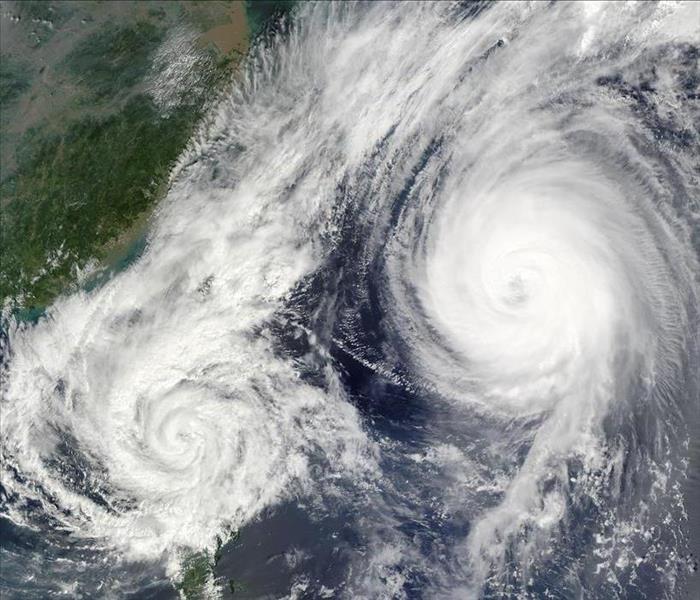 The 2017 Hurricane Season was on of the busiest on record!
The 2017 Hurricane Season was on of the busiest on record!
Hurricane Season, the time of year most likely to produce devastating storms, is finally over for this year. The 2017 Hurricane Season ran from June 1 until November 30 and yielded a whopping 18 total storms, the most powerful of which impacted the South Florida and Caribbean areas. Lets take a took at the stats for this seasons most powerful storms.
Jose-
Duration of storm: September 5 - September 26
Strength at landfall: N/A
Total deaths: 1
Cost of damage: Minimal
Ophelia-
Duration of storm: October 9 - October 16
Strength at landfall: Category 3
Total deaths: 54
Cost of damage: $71 million
Irma-
Duration of storm: August 30 - September 12
Strength at landfall: Category 5
Total deaths: 134
Cost of Damage: $66.77 billion
Harvey-
Duration of storm: August 17 - September 1
Strength at landfall: Category 4
Total deaths: 91
Cost of damage: $198.63 billion (costliest on record)
Maria-
Duration of storm: September 16 - September 30
Strength at landfall: Category 5
Total deaths: 103
Cost of damage: $103.45 billion
This year has been one of the most intense storm seasons in recorded history, but as always, we pulled together and weathered the storm. While there are still some places here in the US and the Caribbean islands trying to recover and rebuild, SERVPRO of Ft. Lauderdale North has your back.
Post-Hurricane Mold: Aftermath of Harvey and Irma
10/5/2017 (Permalink)
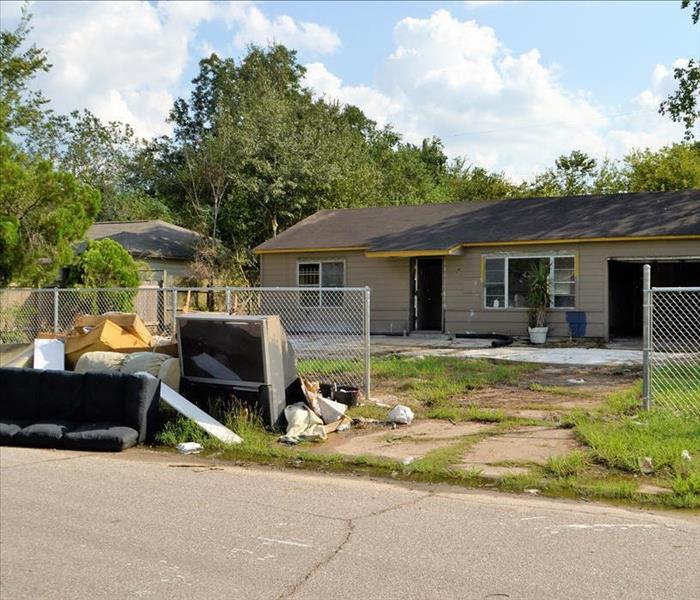 Post-hurricane mold is one of the biggest concerns AFTER a storm.
Post-hurricane mold is one of the biggest concerns AFTER a storm.
The 2017 hurricane season was one of the worst in years. Not only were there more than 5 storms, but over half of them were classified as a "major hurricane" ranking as a category 3 or higher on the Saffir-Simpson Hurricane Scale. This hurricane season is already being called one of the costliest in history as far as damages.
After a storm, your top concern, after you and your family's safety and well being, is damage done to your property. Flooding, leaky roofs, and busted pipes all account for water damage that can turn into a mold problem quickly. Mold issues after a big storm are not uncommon, even if you weren't aware of any moisture in your home.
Loss of power
Refrigerators and freezers:
If you lost power during the storm, there are a few things to look out for that indicate a moisture issue. Refrigerators and freezers often fail during hurricanes. Although keeping the doors closed sometimes helps keep the contents cool, when the power is out for several days, the food will start to get warm and condensate, causing moisture to form (like water on a cold glass). This moisture will leak and puddle, and can even seep into nearby walls.
Air conditioning units:
Air conditioning keeps our homes cool and less humid than the outside, but when the power fails, so does your AC's ability to remove moisture from the air. The busiest part of hurricane season is also the hottest and most humid. In a matter of hours your entire home can become even hotter than outside temperatures. This warm, muggy climate is the perfect breeding ground for microbes like mold.
What now?
If you were unable to catch the water before the formation of post-hurricane mold, or are worried post-hurricane mold may have formed anyway, call SERVPRO Ft. Lauderdale North (or for your local SERVPRO call 1-800-SERVPRO). We will be with you every step of the way to have a third party check for mold while we work with insurance, and get the mold remediated. Even well after the storm, SERVPRO Ft. Lauderdale North has your back with recovery.
SERVPRO Helping Houston
9/25/2017 (Permalink)
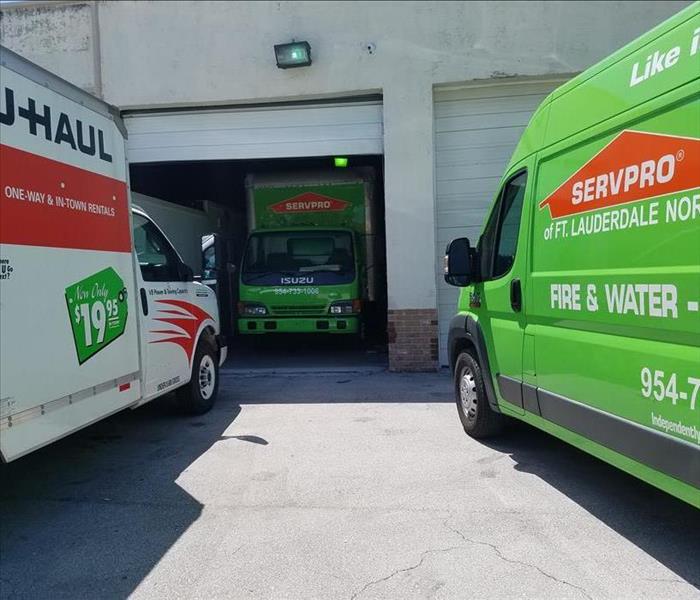 SERVPRO Ft. Lauderdale North helping Houston!
SERVPRO Ft. Lauderdale North helping Houston!
Last month, the largest storm to make landfall in Texas in over 50 years dumped over 2 feet of water on Houston over the course of 3 days. Hurricane Harvey, a category four on the Saffir-Simpson scale, rained more in one hour over the city than the area typically gets during the entire month of August. This record amount of rainfall left homes severely damaged or completely washed away.
After the rain stopped, Texans got to work picking up the pieces of their homes and businesses to get things back to normal. During this time, local SERVPRO teams were so over-encumbered they called in other SERVPRO teams from all over the country to aid in clean-up and restoration. SERVPRO Ft. Lauderdale North was one of hundreds of teams who responded to the call.
We loaded up two UHaul trucks (that UHaul rented to us at a great discount!), an RV, and a few SERVPRO vans and caravaned through three states from Fort Lauderdale to Houston. Over the weeks that followed, we helped many families get their lives back to normal by drying hardwood floors, cleaning carpets, and ripping out soggy drywall.
SERVPRO Ft. Lauderdale North is proud to be part of the Storm Response Team helping Houston recover from the storm. Faster to any size disaster, SERVPRO Ft. Lauderdale North will make it "Like it never even happened."
Lightning Safety and Education
9/19/2017 (Permalink)
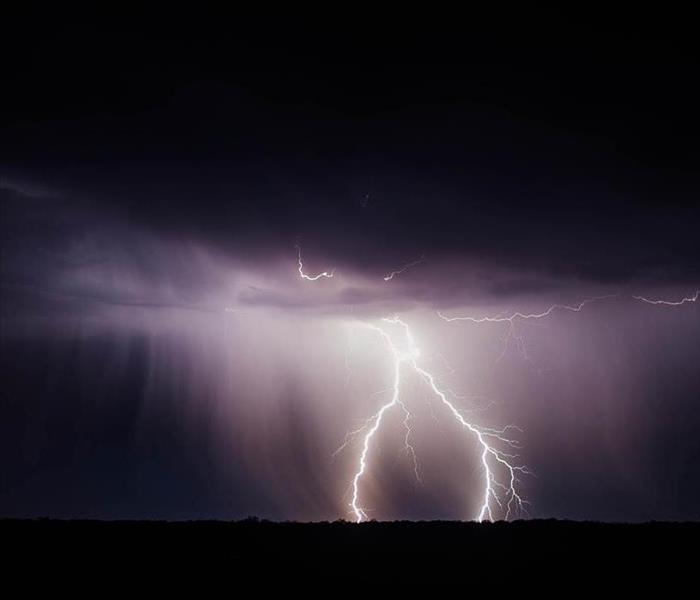 Lightning is supersonic!
Lightning is supersonic!
Lightning strikes the Earth approximately 100 times every second. At up to one billion volts, it is one of the most powerful forces of nature. Due to the high amount of thunder storms, Florida is sometimes called the lightning capital of the world. It's important for everyone living here in South Florida, or even just visiting, to know some basic lightning safety.
What is lightning?
Let's start by looking at what causes lightning. Lightning is caused when negatively charged air particles in the clouds shoot out to meet positively charged trees, lightning rods, ground, etc. The positively charged ground reaches back up to meet up with the negative air particles. When the positive and negative charges meet, the electricity in the air causes it to heat up to 30,000 kelvins (over 53,000 degrees Fahrenheit!). The surface of the sun, in comparison, is only 6,000 kelvins (a little over 10,000 Fahrenheit). The air heats up faster than the speed of sound, creating the crackling SNAP! of thunder. That's the sound of air breaking the sound barrier!
Lightning Safety Tips:
- When lightning is in the area, seek shelter right away- indoors is the safest place for you
- Consider installing a lightning protection system for your home- they are relatively inexpensive and can protect your electronics from lightning strikes
- If there is no lightning protection system, stay away from corded electronics as they can carry the dangerous current for miles
- Only fully-covered metal-framed cars are safe in a thunderstorm- convertibles, motorcycles, and fiberglass-based cars are not safe!
- Stay out from under trees since lighting can still hurt you even if it's not a direct hit
Lightning Fun Facts:
- Lightning strikes have a 10-30% mortality rate
- There's a 1 in 3000 chance you will be struck by lightning in your lifetime
- Lightning often strikes the same place twice- in fact, someone that has been struck once already is more likely to be struck again!
- Lightning can strike 10-15 miles away from the thunderstorm under clear skies- these are called "bolts from the blue"
- Wearing metal has no bearing on whether or not lightning strikes you
- Lightning strikes 30 million different places on the ground in the US every year
Hurricane Preparation 2017 Tips and Tricks
9/5/2017 (Permalink)
 NOAA's website has the latest information on developing storms.
NOAA's website has the latest information on developing storms.
With the height of hurricane season looming, hurricane preparation should be top priority for all Florida residents. SERVPRO Ft. Lauderdale North is here to help with these hurricane preparation tips.
Hurricane preparation tips:
- Before a storm hits make sure you've stocked up on clean drinking water or bottled water- one gallon per person per day for no less than three days.
- Fill large freezer bags with water and freeze them with your freezer turned to its coldest setting. If the power goes out, you'll have blocks of ice to preserve things in the fridge and coolers.
- Invest in a battery powered or hand crank radio to stay up-to-date on what's going on in your area.
- Fill your vehicle's gas tank and any gas cans ahead of time.
- Having a few camping lanterns will come in handy in the event of any power failures.
- Unplug TVs, computers, and appliances before the storm to avoid damages to electronics.
- Consider boarding up your house and going out of town until officials in your area say it's safe to return.
- If you can't stay with friends or family outside of evacuation zones, be aware of your nearest hurricane shelter, and overnight kennels for your furry friends.
- Be sure to withdraw cash from your bank account before the storm as some banks can be closed for days until power is restored.
Hurricane preparation is the most important skill for a south Florida family. The American Red Cross has a complete hurricane preparation checklist available here. Your hurricane preparation should be complete well before a storm hits. SERVPRO Ft. Lauderdale North hopes you have a safe and damage-free storm season, but should disaster strike, SERVPRO Ft. Lauderdale North will arrive "faster to your disaster" and make it "like it never happened."
Preparing for Hurricane Season
10/3/2016 (Permalink)
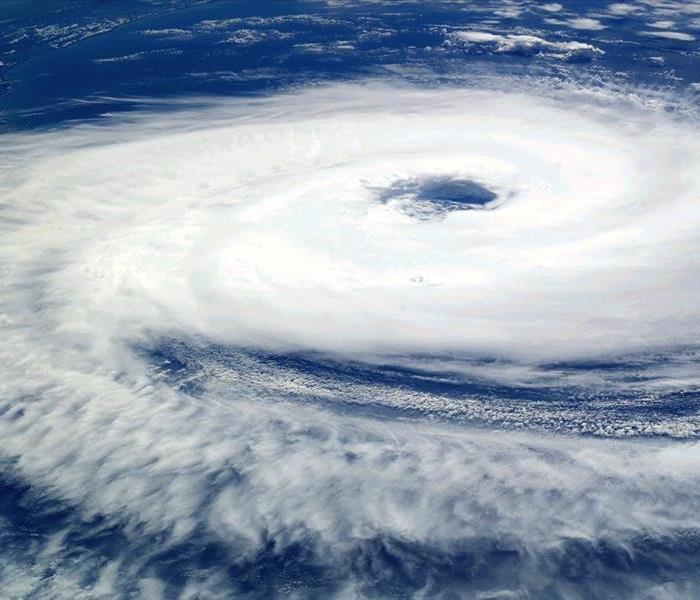 Prepare for Hurricane Season storm damage with SERVPRO of Fort Lauderdale North.
Prepare for Hurricane Season storm damage with SERVPRO of Fort Lauderdale North.
“An ounce of prevention is worth a pound of cure.”
- Benjamin Franklin
Floridians, it’s time for the age old drill: Board up the windows, pull the lawn chairs inside, stock up on food, water and gas. Anyone who has lived here for for a while knows their preparedness procedure like the back of their hand. But something that is often overlooked in the plan for what to do AFTER the worst should happen. Emergency services will do their duty to make sure you and your family are safe following a disaster, but who will restore your home and your life back to the way it was?
Enter the SERVPRO Ready App. Simply download our app on your mobile device and fill out all the important information you may need before hand, saving you time after a disaster, when minutes count and saving your information in case of loss or damage. And best of all, it’s FREE! So add the SERVPRO Ready App to your hurricane preparedness kit, and choose SERVPRO of Ft. Lauderdale North as your disaster response team. Stay safe this hurricane season, hope for the best, but if the worst should happen, depend on SERVPRO of Fort Lauderdale North to make it “Like it never even happened.”
Anything Can Happen, Let Us Help
7/27/2016 (Permalink)
Living in South Florida we experience a lot of heavy rains and, unfortunately, hurricanes. Hurricanes mean a lot of water. A lot of water can lead to water damage. If water damage sticks around for too long it can cause major issues within the home. SERVPRO Ft. Lauderdale North professionals are here to help immediately after a storm passes through, making sure the storm doesn’t ruin your home any further. Hurricane season lasts until November 31st so make sure to be prepared and have SERVPRO Ft. Lauderdale North on speed dial (954-733-1006) if anything should go wrong.
Whether its water damage, fire damage, mold damage or even bio-hazard remediation, small scale or a large loss, you can rely on SERVPRO of Fort Lauderdale North's qualified Mold, Fire and water damage specialists to give you peace of mind knowing we'll arrive faster to your disaster and make it "Like it never even happened". Call us anytime at 954-733-1006
Survive The Storm
7/21/2016 (Permalink)
As you may know, hurricane season has already started and it will be sticking around until the end of November. This unpredictable season can affect your travel plans or just a quiet and simple summer at home. If you plan on traveling during hurricane season and are concerned about the weather believe it or not....there’s an app for that. The American Red Cross Association, who we are a proud sponsor of, created an app called Hurricane by American Red Cross to monitor hurricane conditions in your local area, throughout the storm track, and let others know you are safe even if the power is out. The app also allows you to monitor the weather of the destination desired. This is a great app. We recommend to download it and use it throughout the year.
Also, if you haven't done so already, building a hurricane survival kit is essential during this time of year. Especially if you decide to stay home and weather out the storm. Here are some essential items to start a Hurricane Survival Kit:
· Water (one gallon per person, per day)
· None perishable food
· Flashlights and batteries
· First Aid Kit
· Battery powered radio
· Insect repellant
· Moist towelettes
· Manuel can opener
· Change of clothes
· Toiletries
The list can go on, but these are some essentials that would make surviving a disastrous hurricane a lot easier.
Have a safe and happy rest of the summer!
 If a storm leaves your Wilton Manor home with flood damage, call SERVPRO. We're Faster to any size disaster™.
If a storm leaves your Wilton Manor home with flood damage, call SERVPRO. We're Faster to any size disaster™.

 24/7 Emergency Service
24/7 Emergency Service












